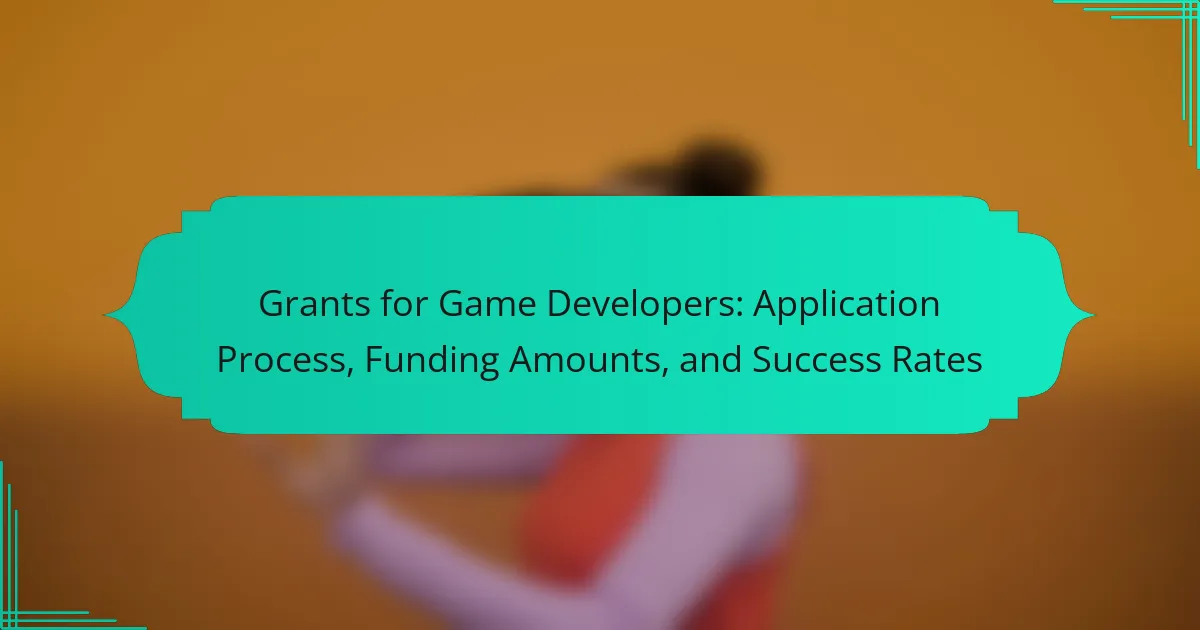Game developers often seek funding to bring their creative visions to life. This article explores various grants available, detailing the application process, typical funding amounts, and success rates. Understanding these aspects is essential for navigating the competitive landscape of game development funding. Key sources include government programs, private foundations, and industry organizations that support innovative projects.
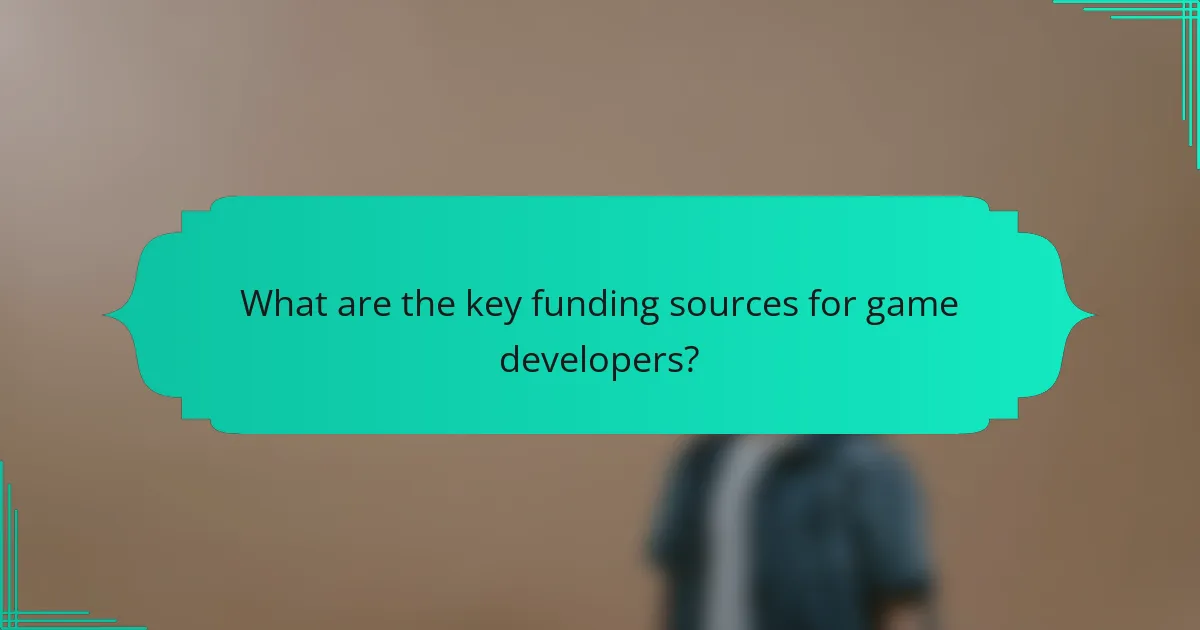
What are the key funding sources for game developers?
Game developers can access funding through various grants. Key sources include government programs, private foundations, and industry-specific organizations that support creative projects.
| Funding Source | Application Process | Typical Funding Amounts | Success Rates |
|————————–|————————————–|————————-|——————|
| Government Grants | Submit proposals outlining project | $10,000 – $500,000 | 20% – 30% |
| Private Foundations | Apply with detailed project plans | $5,000 – $250,000 | 15% – 25% |
| Industry Organizations | Follow specific guidelines for submission | $1,000 – $100,000 | 10% – 20% |
| Crowdfunding Platforms | Create campaigns to solicit funds | Varies widely | 30% – 40% |
| University Grants | Collaborate with academic institutions | $2,000 – $50,000 | 25% – 35% |
Which organizations provide grants specifically for game development?
Several organizations provide grants specifically for game development. Notable examples include the Epic Games MegaGrants, the Canada Media Fund, and the National Endowment for the Arts. These grants support a variety of projects, from indie games to innovative technologies. Each organization has distinct application processes, funding amounts, and eligibility criteria, which can significantly impact a developer’s success rate in securing funding.
How do regional funding opportunities differ for game developers?
Regional funding opportunities for game developers vary significantly based on local government initiatives and economic conditions. For instance, some regions offer substantial grants specifically aimed at fostering innovation in the gaming industry, while others may provide tax incentives or low-interest loans.
Funding amounts can differ widely; some grants may offer up to $500,000, while others might provide smaller amounts, such as $10,000. Success rates for applications also fluctuate, with competitive regions seeing lower approval rates due to high demand.
Unique attributes, such as regional focus on specific genres or platforms, can influence the types of funding available. Rare opportunities may arise from partnerships with local universities or tech hubs, providing additional resources for developers.
Overall, understanding these regional differences is crucial for game developers seeking financial support.
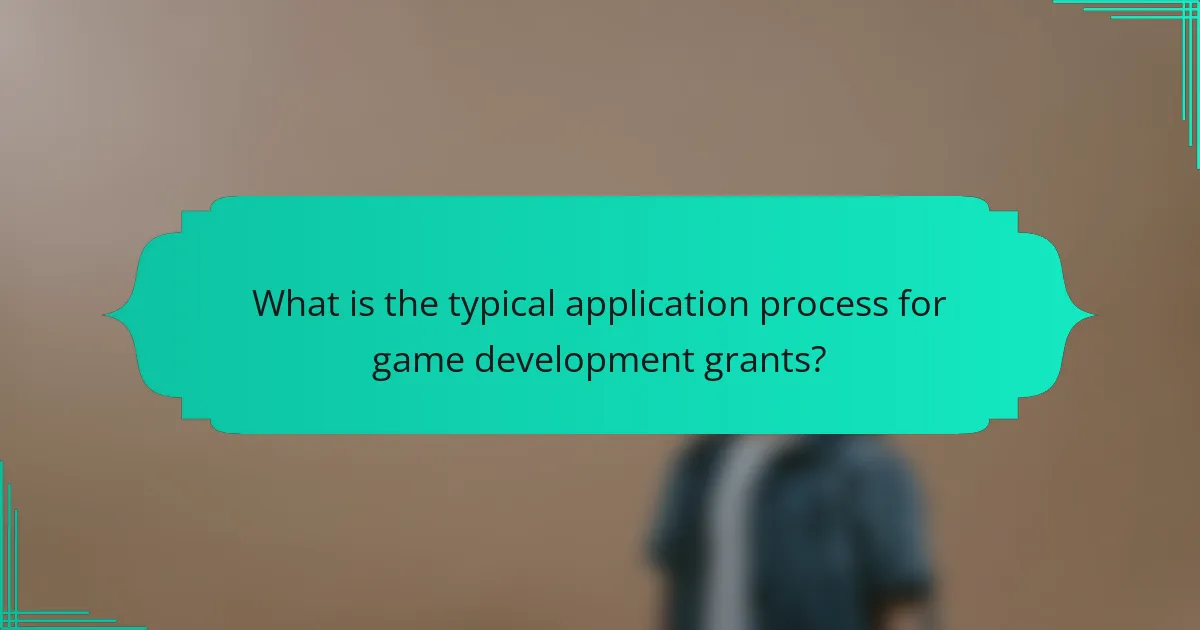
What is the typical application process for game development grants?
The typical application process for game development grants involves several key steps. First, developers must research available grants that align with their project goals. Next, they prepare a detailed proposal outlining their game concept, budget, and timeline. After submission, applications are reviewed by grant committees who assess eligibility and project viability. Finally, successful applicants receive funding, while others may receive feedback for future applications.
What documentation is required when applying for grants?
When applying for grants, documentation typically includes a project proposal, budget outline, proof of eligibility, and supporting materials. These documents demonstrate the project’s viability and alignment with funding objectives.
How can game developers improve their chances of a successful application?
Game developers can enhance their chances of a successful application by thoroughly researching available grants and tailoring their proposals. Understanding the specific requirements and criteria of each grant is crucial.
Building a strong project narrative that clearly outlines the game’s vision, target audience, and unique attributes will resonate with grant reviewers. Providing detailed budgets and timelines can also improve credibility.
Networking with other developers and attending industry events can yield valuable insights into successful strategies. Finally, revising applications based on feedback from previous submissions can lead to improved outcomes.
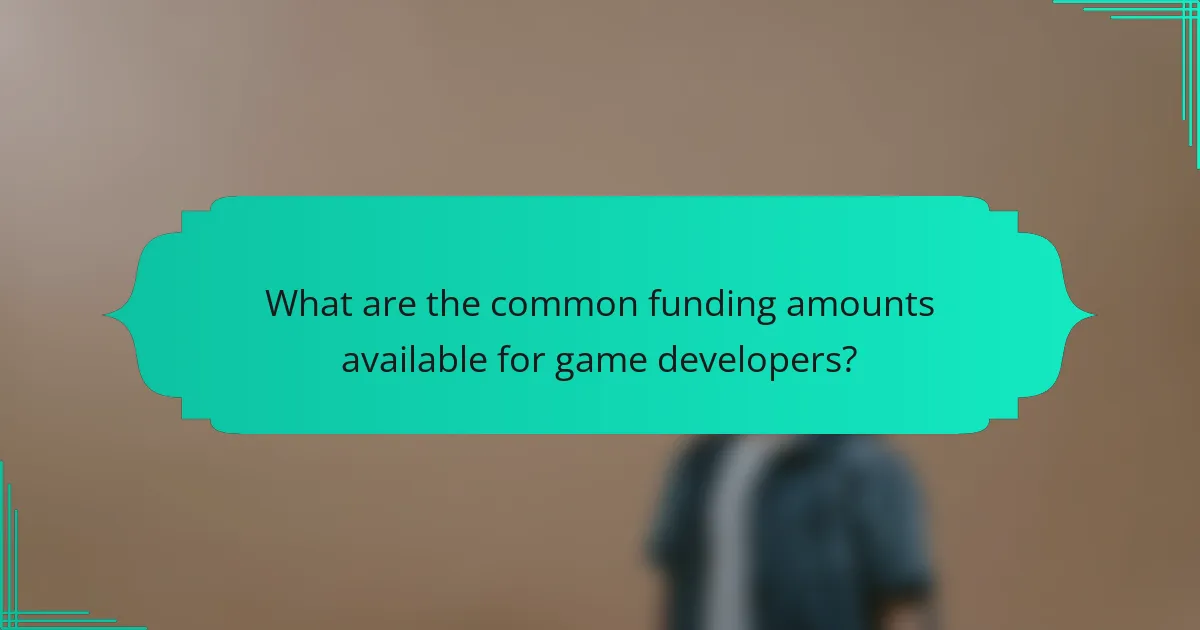
What are the common funding amounts available for game developers?
Common funding amounts for game developers typically range from $10,000 to $500,000. Various grants support different stages of game development, with larger amounts often allocated for innovative projects. For instance, government grants may offer up to $200,000, while private foundations can provide funding exceeding $300,000. Success rates for these grants vary, with competitive applications often yielding better outcomes. Understanding the specific funding options available is crucial for developers seeking financial support.
How do funding amounts vary by grant type or organization?
Funding amounts for grants vary significantly based on the type of grant and the organization offering it. For instance, government grants may provide higher funding levels compared to private foundations.
| Grant Type | Average Funding Amount |
|———————|———————–|
| Government Grants | $50,000 – $500,000 |
| Private Foundations | $10,000 – $250,000 |
| Crowdfunding | $1,000 – $100,000 |
| Corporate Sponsorship | $5,000 – $200,000 |
| Nonprofit Grants | $15,000 – $300,000 |
| International Grants | $20,000 – $1,000,000 |
Organizations with a focus on innovative technology often offer larger amounts. Additionally, niche grants for specific genres or platforms may have unique funding ranges, reflecting their targeted support for game developers.
What are the financial implications of grant funding for independent developers?
Grant funding can significantly enhance financial stability for independent developers by providing essential capital without the obligation of repayment. This funding can cover development costs, marketing expenses, and operational overhead, allowing developers to focus on creativity and innovation. The average grant amount varies, but successful applicants can receive between $10,000 to $100,000, depending on the grant’s scope and requirements. Success rates for grant applications can vary widely, typically ranging from 10% to 30%, influenced by the competitiveness of the grant and the quality of the proposal.
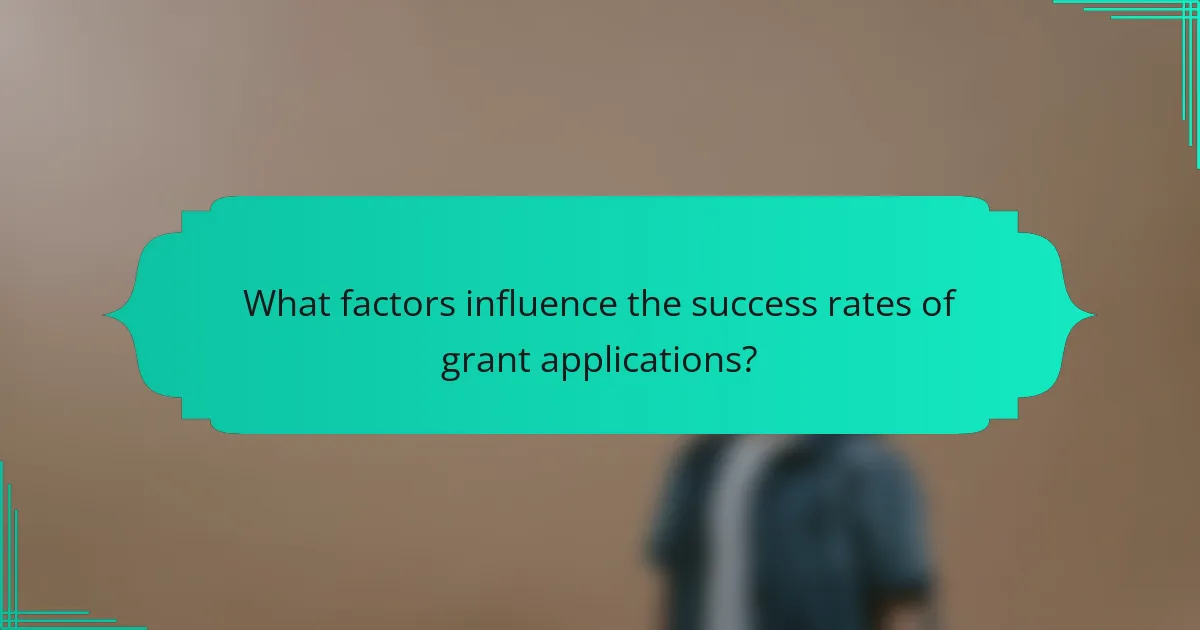
What factors influence the success rates of grant applications?
Several factors influence the success rates of grant applications for game developers. Key elements include the clarity of the project proposal, alignment with the funding organization’s priorities, and the developer’s track record. Additionally, the project’s innovation level and potential impact on the gaming industry play significant roles. Networking and relationships with grant providers can also enhance success rates.
How do project quality and innovation impact funding success?
Project quality and innovation significantly enhance funding success for game developers. High-quality projects demonstrate professionalism and feasibility, attracting more funding opportunities. Innovative concepts stand out, making applications more compelling to grant reviewers. Furthermore, projects that incorporate unique attributes often receive higher funding amounts due to perceived market potential. In summary, prioritizing quality and innovation can substantially improve the chances of securing grants.
What role does the developer’s experience play in grant approval?
The developer’s experience significantly influences grant approval. Experienced developers demonstrate a track record of successful projects, which enhances credibility. Grant reviewers often prioritize applicants with proven skills, as this suggests a higher likelihood of project success. Additionally, experienced developers may have better project management and technical capabilities, making their proposals more compelling. Ultimately, a strong background can lead to increased funding amounts and improved success rates in the grant application process.
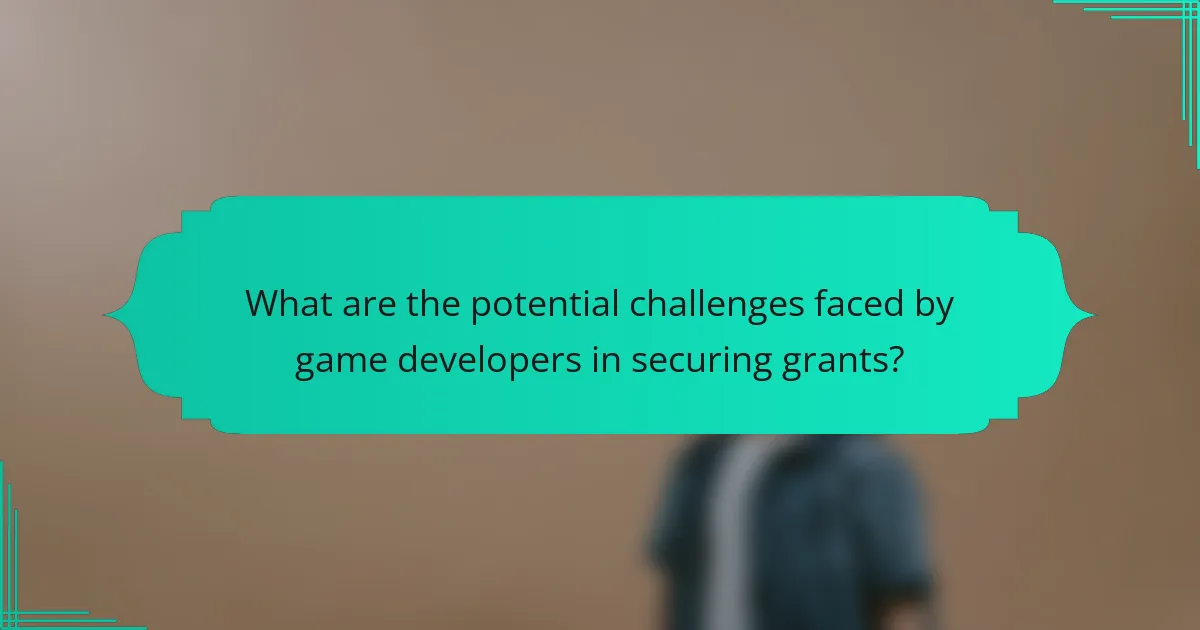
What are the potential challenges faced by game developers in securing grants?
Game developers face several challenges in securing grants, including intense competition, unclear eligibility criteria, and lengthy application processes. Additionally, many developers lack experience in grant writing, which can hinder their success. The fluctuating availability of funds and changing priorities of grant-giving organizations further complicate the landscape. Understanding these obstacles is crucial for improving the chances of obtaining funding.
How can developers navigate bureaucratic hurdles in the application process?
Developers can navigate bureaucratic hurdles in the application process by understanding requirements and maintaining clear communication. Familiarizing themselves with the specific guidelines of funding organizations is crucial. Building relationships with program officers can provide insights and facilitate smoother applications. Additionally, preparing thorough documentation and adhering to deadlines enhances success rates.
What are the most common mistakes made in grant applications?
Common mistakes in grant applications include lack of clarity, insufficient research, and failure to follow guidelines. Applicants often neglect to clearly articulate their project goals and objectives, which can lead to confusion. Additionally, inadequate understanding of the funding organization’s priorities can result in misaligned proposals. Not adhering to submission requirements, such as formatting and deadlines, is another frequent error. Lastly, overlooking the importance of a compelling narrative can diminish the application’s impact, reducing the chances of funding success.
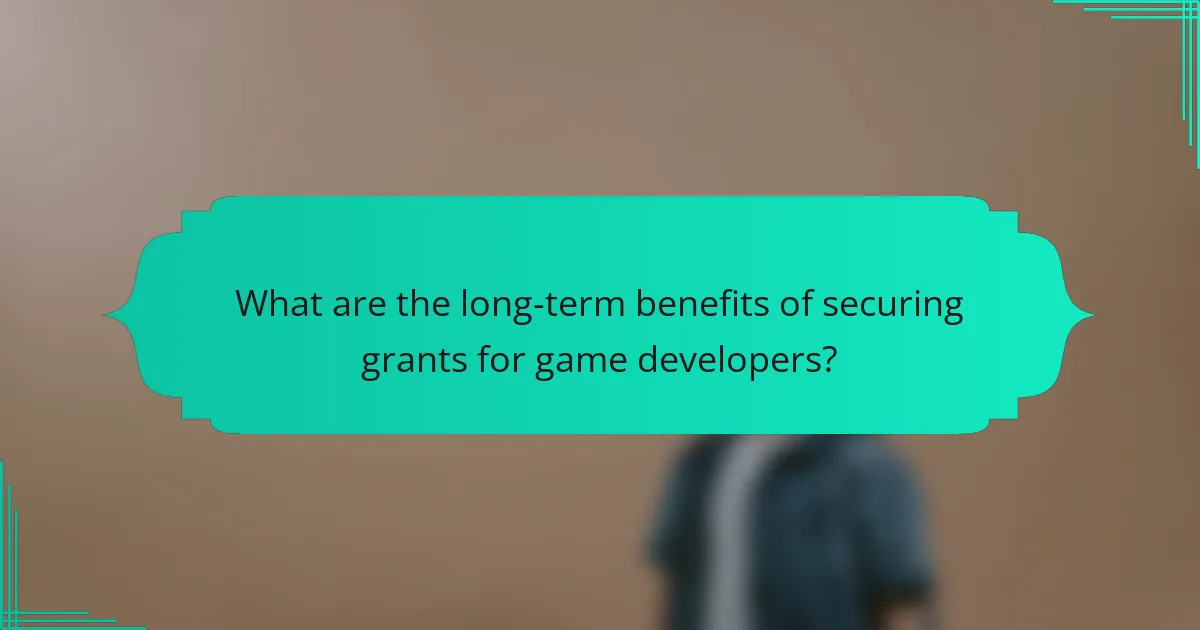
What are the long-term benefits of securing grants for game developers?
Securing grants for game developers offers long-term benefits such as sustained financial support, enhanced project credibility, and access to valuable resources. These advantages can lead to improved game quality and increased chances of market success. Additionally, grants often foster community connections and networking opportunities, which can be crucial for future projects. Over time, this support can contribute to a developer’s reputation and longevity in the gaming industry.
How can grants influence the growth and sustainability of a game studio?
Grants can significantly enhance the growth and sustainability of a game studio by providing essential funding for development. These financial resources enable studios to invest in talent, technology, and marketing, facilitating project completion and market entry. For instance, studios that secure grants often report higher success rates in launching their games compared to those relying solely on private funding. Additionally, grants can foster innovation by allowing developers to experiment with new ideas without the pressure of immediate profitability. As a result, the right grants can be pivotal in shaping a studio’s long-term trajectory.
What are the networking opportunities that arise from grant funding?
Grant funding creates networking opportunities for game developers by connecting them with industry professionals, potential collaborators, and investors. These connections can lead to partnerships, mentorships, and access to resources that enhance project development. Additionally, grant recipients often participate in events and forums, further expanding their professional network. Engaging with grant organizations can also open doors to exclusive events tailored for developers, fostering community and collaboration.
What best practices should game developers follow when applying for grants?
Game developers should focus on clarity, alignment with grant objectives, and showcasing innovation when applying for grants. They must present a compelling narrative that highlights their project’s uniqueness and potential impact.
1. Research grant opportunities thoroughly to ensure alignment with project goals.
2. Prepare a detailed budget that justifies funding requests.
3. Create a strong project proposal that clearly communicates vision and objectives.
4. Include prototypes or demos to demonstrate project feasibility.
5. Address potential challenges and outline solutions to show preparedness.
6. Follow submission guidelines meticulously to avoid disqualification.
